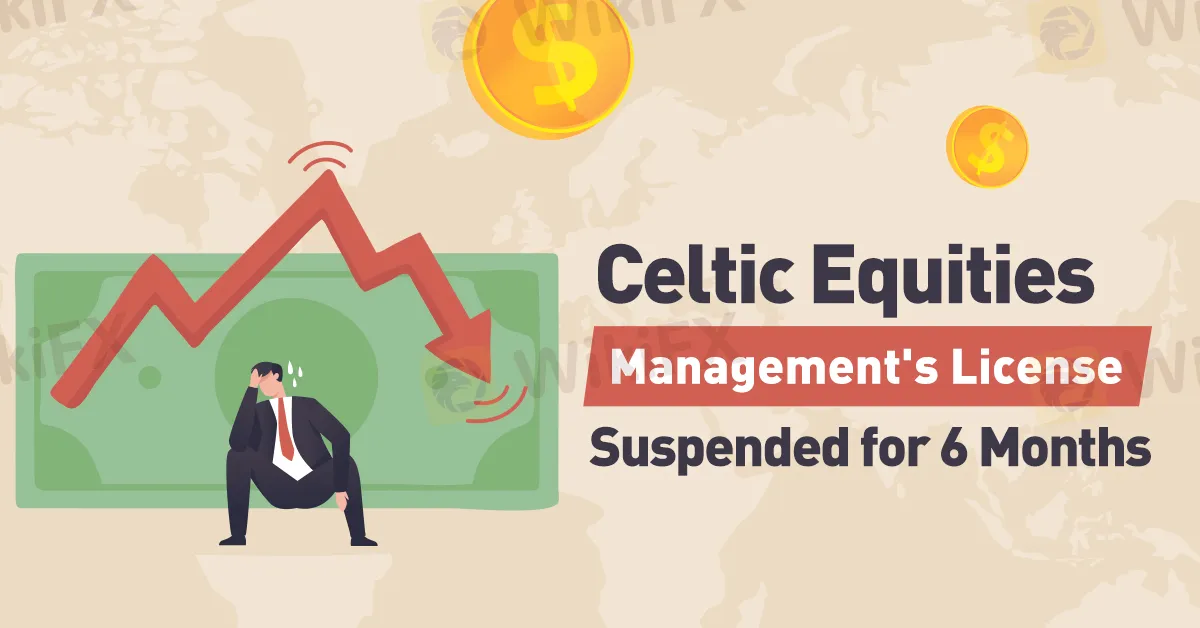简体中文
繁體中文
English
Pусский
日本語
ภาษาไทย
Tiếng Việt
Bahasa Indonesia
Español
हिन्दी
Filippiiniläinen
Français
Deutsch
Português
Türkçe
한국어
العربية
Celtic Equities Management's License Suspended for 6 Months
Abstract:The Australian Securities and Investments Commission (ASIC) has taken a decisive step, suspending Celtic Equities Management Pty Ltd's Australian Financial Services (AFS) license for six months, following the revelation of multiple breaches of regulatory obligations.

The Australian Securities and Investments Commission (ASIC) has taken a significant regulatory step by suspending the Australian Financial Services (AFS) license of Celtic Equities Management Pty Ltd for a duration of six months. This decisive action was prompted by ASIC's comprehensive surveillance, which brought to light multiple breaches of regulatory obligations committed by this financial services provider.
Effective from October 19, 2023, ASIC's regulatory move directly addresses Celtic Equities Management's failure to meet critical compliance requirements. These non-compliance issues are twofold: first, the company failed to fulfil its obligation to submit financial statements and audit reports for the financial years ending between June 30, 2017, and June 30, 2022. Secondly, Celtic Equities Management was found to have outstanding ASIC Industry Funding Levies that remained unpaid, in addition to the accumulation of unsettled late payment penalties.

Celtic Equities Management Pty Ltd, which holds the AFS number 245486, has maintained AFS license 225216 since December 11, 2003. The suspension of Celtic Equities Management's AFS license is a measure designed to provide the company with an opportunity to address these compliance matters appropriately.
Over the course of this six-month period, the firm is expected to take all necessary actions to clearly demonstrate its commitment and capability to meet its pending obligations to ASIC. It is imperative to emphasize that should Celtic Equities Management fail to rectify its compliance issues by the conclusion of the six-month suspension, ASIC has unequivocally stated its intention to consider further regulatory actions. These actions could potentially result in the revocation of the company's AFS license.

Disclaimer:
The views in this article only represent the author's personal views, and do not constitute investment advice on this platform. This platform does not guarantee the accuracy, completeness and timeliness of the information in the article, and will not be liable for any loss caused by the use of or reliance on the information in the article.
Read more

The Daily Habits of a Profitable Trader
Every professional trader follows a structured approach to ensure they are well-prepared, disciplined, and able to seize opportunities with confidence. Whether you are a seasoned investor or an aspiring trader, adhering to a robust daily checklist can significantly enhance your performance. Use this checklist to check if you are a qualified trader

The Impact of Interest Rate Decisions on the Forex Market
Interest rate changes determine currency attractiveness, influencing capital flows and exchange rate trends. Understanding this mechanism helps investors navigate the forex market effectively.

How a Housewife Lost RM288,235 in a Facebook Investment Scam
A 47-year-old housewife in Malaysia recently fell victim to an online investment scam, losing a substantial sum of RM288,235 after engaging with a fraudulent scheme advertised on Facebook.

A Trader’s Worst Mistake: Overlooking Broker Reviews Could Cost You Everything
In today’s digital age, reviews influence nearly every decision we make. When purchasing a smartphone, television, or home appliance, we pore over customer feedback and expert opinions to ensure we’re making the right choice. So why is it that, when it comes to choosing an online broker where real money and financial security are at stake many traders neglect the crucial step of reading reviews?
WikiFX Broker
Latest News
The Withdrawal Trap: How Scam Brokers Lure Victims into Paying More
FCA to Investors: Think Twice Before Trusting These Brokers
Trump\s tariffs: How could they affect the UK and your money
Trump gambles it all on global tariffs he\s wanted for decades
TradingView Brings Live Market Charts to Telegram Users with New Mini App
Trump tariffs: How will India navigate a world on the brink of a trade war?
Interactive Brokers Launches Forecast Contracts in Canada for Market Predictions
Authorities Alert: MAS Impersonation Scam Hits Singapore
IG Group Acquires Freetrade for £160M to Expand UK Investment Market
U.S. March ISM Manufacturing PMI Released
Currency Calculator







